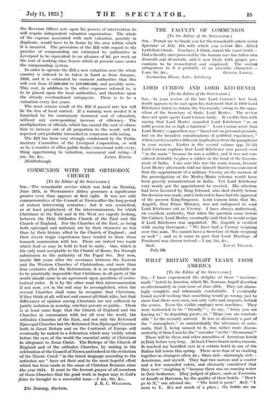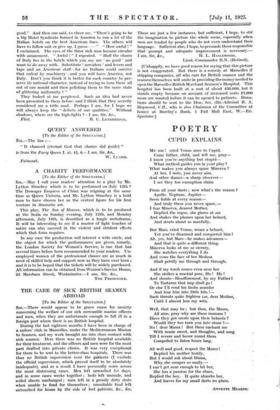WHAT BRITAIN MIGHT LEARN FROM AMERICA [To the Editor of
the SPECTATOR.] have experienced the delights of those " machine. made " hotels in America, which Mr. Norman Angell describes so affectionately in your issue of June 20th. They are alarm- ingly complete and inhumanly comfortable. I eventually found myself wishing that something would go wrong, just to show that there, were men, not only volts and amperes, behind the scenes. Even the visible employes were machines. They were instructed to be " friendly " ; to say, " Sorry you are leaving us" to departing guests, or, " Hope you are comfort- able " to the recently arrived. It was so obviously a part of the " atmosphere," so unmistakably the utterance of auto- mata, that I, being unused to it, was rather more discon- certed by it than I was by the " servidor " or the " thermostat." There will be these and other amenities of American hotels in Italy before very long. At least I have heard such a rumour. It reached my horrified ears in a certain hotel in one of the Italian hill towns this spring. There were four of us chatting together as strangers often do ; three rich—alarmingly rich— Americans, and myself. They had two motors and a courier and a few concealed valets, and obviously considered that they were " roughing it " because there was no running water in their bedrooms. They judged of places, such as Taormina or Amalfi or Ravenna, by the quality of their hotels. "Don't go to X," one advised me. " The hotel is poor." And, " I went to Y. It's not much of a place ; the hotels arc no
good." And then one said, to cheer me, " There's going to be a big Hotel Syndicate formed in America to run a lot of the Italian hotels on the best American lines. The others will have to follow suit or give up, I guess—" " How awful ! " I exclaimed. The eyes of the three rich men became circular with amazement. " Awful ! " I repeated. " Half the charm of Italy lies in the hotels which you say are ' no good ' and want to do away with. Substitute servidors ' and levers and taps and an American staff—for no Italians could survive that ordeal by machinery—and you will have America, not Italy. Don't you think it is better for each country to pre- serve its national character, instead of trying to turn them all out of one mould and then polishing them to the same state of glittering uniformity ? "
They looked at me perplexed. Such an idea had never been presented to them before, and I think that they secretly considered me a trifle mad. Perhaps I am, for I hope we will always keep the " defects of our qualities." Without shadows, where are the high-lights ?—I am, Sir, &c.,



























































 Previous page
Previous page